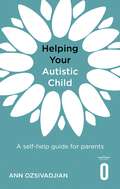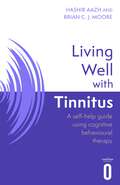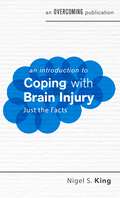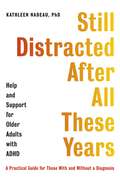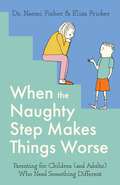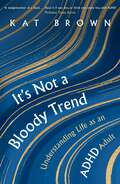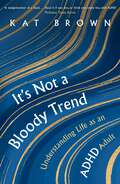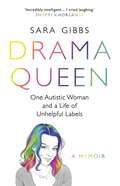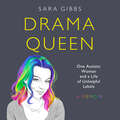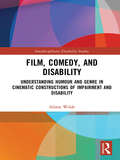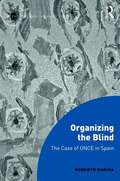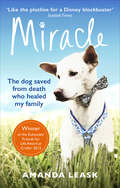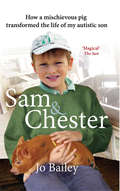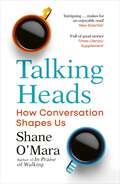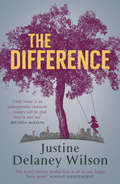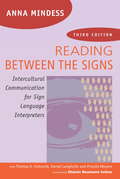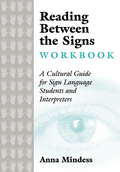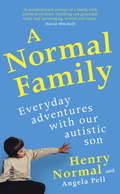- Table View
- List View
Helping Your Autistic Child: A self-help guide for parents (Helping Your Child)
by Ann OzsivadjianPractical, evidence-based advice for managing distressed behaviours and common situations involving autistic children. Autism affects about one per cent of the population, and whilst it can present very differently among individuals, there are some common challenges faced by autistic people. This self-help guide focuses on practical, proven techniques to help parents support their autistic children with commonly experienced areas of difficulty. Written by authors with extensive experience in research and in working clinically with children with a wide range of neurodevelopmental differences, this book uses a strengths-based approach to guide parents in helping their children to enhance their skills, as well as to manage some common challenges.This book will help you to: · Support your child through anxiety and social interaction issues · Manage sleep problems and feeding difficulties · Understand sensory responses in autism · Understand and manage distressed behaviour, including self-harm and demand avoidanceHelping Your Child is a series for parents and caregivers to support children through developmental difficulties, both psychological and physical. Each guide uses clinically proven techniques. Series editors: Dr Polly Waite and Emeritus Professor Peter Cooper
Helping Your Autistic Child: A self-help guide for parents (Helping Your Child)
by Ann OzsivadjianPractical, evidence-based advice for managing distressed behaviours and common situations involving autistic children. Autism affects about one per cent of the population, and whilst it can present very differently among individuals, there are some common challenges faced by autistic people. This self-help guide focuses on practical, proven techniques to help parents support their autistic children with commonly experienced areas of difficulty. Written by authors with extensive experience in research and in working clinically with children with a wide range of neurodevelopmental differences, this book uses a strengths-based approach to guide parents in helping their children to enhance their skills, as well as to manage some common challenges.This book will help you to: · Support your child through anxiety and social interaction issues · Manage sleep problems and feeding difficulties · Understand sensory responses in autism · Understand and manage distressed behaviour, including self-harm and demand avoidanceHelping Your Child is a series for parents and caregivers to support children through developmental difficulties, both psychological and physical. Each guide uses clinically proven techniques. Series editors: Dr Polly Waite and Emeritus Professor Peter Cooper
Living Well with Tinnitus: A self-help guide using cognitive behavioural therapy (Living Well #1)
by Brian C.J. Moore Hashir Aazh'With real life examples to guide the reader and proven cognitive behavioural techniques, this will help people to overcome the distress associated with tinnitus and live a meaningful life'Dr Rory Allott, Greater Manchester NHS Foundation TrustWorldwide, about one billion people experience tinnitus at some point in their life. It is a life-changing experience for many of them. Learning effective management strategies in a timely fashion is the key to dealing with this difficult condition.This book combines cutting-edge knowledge of auditory science and theoretical frameworks in modern psychology with insight and real-life, human examples from clinical practice. Packed with metaphors and practical tips, the authors aid understanding of complex concepts by introducing an accessible and entertaining cast of characters from history and fiction, from Beauty and the Beast to Moby Dick, from Dante to Muhammad Ali, and from Sigmund Freud to Rumi.By following the advice in this book, you will:· Gain a realistic picture of what the recovery from tinnitus-related distress looks like· Learn how to go beyond the difficulties and annoyance caused by tinnitus and pay attention to the meanings behind those experiences· Develop skills that are proven to help on your journey.Everything that you need to know about living well with tinnitus is presented in ten steps!Living Well self-help guides use clinically proven techniques to treat long-standing and disabling conditions, both psychological and physical.Series Editors: Professor Kate Harvey and Emeritus Professor Peter Cooper
Living Well with Tinnitus: A self-help guide using cognitive behavioural therapy (Living Well #1)
by Brian C.J. Moore Hashir Aazh'With real life examples to guide the reader and proven cognitive behavioural techniques, this will help people to overcome the distress associated with tinnitus and live a meaningful life'Dr Rory Allott, Greater Manchester NHS Foundation TrustWorldwide, about one billion people experience tinnitus at some point in their life. It is a life-changing experience for many of them. Learning effective management strategies in a timely fashion is the key to dealing with this difficult condition.This book combines cutting-edge knowledge of auditory science and theoretical frameworks in modern psychology with insight and real-life, human examples from clinical practice. Packed with metaphors and practical tips, the authors aid understanding of complex concepts by introducing an accessible and entertaining cast of characters from history and fiction, from Beauty and the Beast to Moby Dick, from Dante to Muhammad Ali, and from Sigmund Freud to Rumi.By following the advice in this book, you will:· Gain a realistic picture of what the recovery from tinnitus-related distress looks like· Learn how to go beyond the difficulties and annoyance caused by tinnitus and pay attention to the meanings behind those experiences· Develop skills that are proven to help on your journey.Everything that you need to know about living well with tinnitus is presented in ten steps!Living Well self-help guides use clinically proven techniques to treat long-standing and disabling conditions, both psychological and physical.Series Editors: Professor Kate Harvey and Emeritus Professor Peter Cooper
An Introduction to Coping with Brain Injury (An Introduction to Coping series)
by Nigel S. KingJust the facts for coping with the after-effects of a brain injuryAcquired Brain Injury (ABI) usually refers to people who have suffered a head injury or stroke but also includes those who have had brain tumours, an anoxic injury (where the brain has been starved of oxygen) or brain illnesses like encephalitis and meningitis. After an ABI, the brain undergoes a very slow healing process before improvements slow down and eventually plateau. This is different to other forms of brain conditions where the journey is more of a deteriorating one over time.ABI is commonly called 'a hidden disability' as it can easily be missed or misunderstood by others. Also it can significantly affect those close to the person and therefore it is frequently called 'a family affair' too. As the issues are often hidden, complicated and affect patients and families alike, this book can act as a roadmap to help you and your loved ones navigate through the complex and often unexpected challenges that can arise following a brain injury, using:- Cognitive rehabilitation approaches to understand and manage changes in our thinking abilities- Cognitive behavioural approaches to address ways in which our thoughts, feelings, actions and physical reactions relate to each other
An Introduction to Coping with Brain Injury (An Introduction to Coping series)
by Nigel S. KingJust the facts for coping with the after-effects of a brain injuryAcquired Brain Injury (ABI) usually refers to people who have suffered a head injury or stroke but also includes those who have had brain tumours, an anoxic injury (where the brain has been starved of oxygen) or brain illnesses like encephalitis and meningitis. After an ABI, the brain undergoes a very slow healing process before improvements slow down and eventually plateau. This is different to other forms of brain conditions where the journey is more of a deteriorating one over time.ABI is commonly called 'a hidden disability' as it can easily be missed or misunderstood by others. Also it can significantly affect those close to the person and therefore it is frequently called 'a family affair' too. As the issues are often hidden, complicated and affect patients and families alike, this book can act as a roadmap to help you and your loved ones navigate through the complex and often unexpected challenges that can arise following a brain injury, using:- Cognitive rehabilitation approaches to understand and manage changes in our thinking abilities- Cognitive behavioural approaches to address ways in which our thoughts, feelings, actions and physical reactions relate to each other
Still Distracted After All These Years: Help and Support for Older Adults with ADHD
by Kathleen NadeauThe world's foremost expert shares advice on later-in-life ADHD, tackling everything from finances, parenting, planning for retirement, social life and work, in this practical and helpful guide for those with and without a diagnosis.Do you...· Forget to pay bills?· Live in a disorganised environment?· Struggle with mental health?· Procrastinate on projects, even ones that initially excite you?· Have high levels of conflict with those close to you?· Have a child diagnosed with ADHD and/or a family history of learning disorders?If some of these patterns sound familiar, you might understandably fear the onset of dementia, but you may have undiagnosed attention deficit hyperactivity disorder (ADHD). ADHD in adults is one of the most common disorders. Living with ADHD in our later years is hugely influenced by co-occurring issues, such as anxiety, depression or low self-esteem. In addition, the presence of learning disorders, heightened levels of stress, the presence or lack of support from others, and the number of people we are responsible for, can all complicate and intensify the effects of ADHD.The good news is that you've come to the right place to learn more about how to lead a calmer, happier, more productive life. Dedicated to the health and wellbeing of today's older adults with ADHD, Still Distracted After All These Years offers strategies to build a support system, gain better control over your daily life and create a more ADHD-friendly retirement.
When the Naughty Step Makes Things Worse: Parenting for Children (and Adults) Who Need Something Different
by Dr. Naomi Fisher Eliza FrickerSome children just haven't read the parenting books. The harder you try, the worse it gets.There's a hidden contract at the heart of parenting. It's the idea that if parents just get it right, their children can be made to do what they want. Manuals explain how to make it very clear to your children what you want them to do − and how to respond when they don't cooperate. With the right rewards and consequences in place, parents are meant to ensure that their children stay under control. That's Time Out and the Naughty Step (for the little ones) or grounding and withdrawing screen privileges (for the older ones). If that doesn't work, parents are told to be more consistent. But what happens if your child is even more consistent than you? For every so often, along comes a child who hasn't signed the contract. They don't buy in. When they are put on the Naughty Step, they refuse point blank to stay there. Promises of stickers and rewards get you nowhere at all. Take their iPad away and they say, 'Fine, but I'm still not doing that'. These are the children who rip up the rule book. Their parents are left floundering. The more they try to bring their children under control, the clearer it is that they aren't haven't any of it. The firmer the boundaries, the worse their behaviour becomes. Things can go downhill fast. This down-to-earth, illustrated guide is for parents who need something different. It's for those who are fighting battles where they didn't know battles could be fought. It's for those who suspect that what they are doing isn't helping - but they don't know what else to do. It's for families who need a better way to live and who want their children (and themselves) to thrive.
When the Naughty Step Makes Things Worse: Parenting for Children (and Adults) Who Need Something Different
by Dr. Naomi Fisher Eliza FrickerSome children just haven't read the parenting books. The harder you try, the worse it gets.There's a hidden contract at the heart of parenting. It's the idea that if parents just get it right, their children can be made to do what they want. Manuals explain how to make it very clear to your children what you want them to do − and how to respond when they don't cooperate. With the right rewards and consequences in place, parents are meant to ensure that their children stay under control. That's Time Out and the Naughty Step (for the little ones) or grounding and withdrawing screen privileges (for the older ones). If that doesn't work, parents are told to be more consistent. But what happens if your child is even more consistent than you? For every so often, along comes a child who hasn't signed the contract. They don't buy in. When they are put on the Naughty Step, they refuse point blank to stay there. Promises of stickers and rewards get you nowhere at all. Take their iPad away and they say, 'Fine, but I'm still not doing that'. These are the children who rip up the rule book. Their parents are left floundering. The more they try to bring their children under control, the clearer it is that they aren't haven't any of it. The firmer the boundaries, the worse their behaviour becomes. Things can go downhill fast. This down-to-earth, illustrated guide is for parents who need something different. It's for those who are fighting battles where they didn't know battles could be fought. It's for those who suspect that what they are doing isn't helping - but they don't know what else to do. It's for families who need a better way to live and who want their children (and themselves) to thrive.
It's Not A Bloody Trend: Understanding Life as an ADHD Adult
by Kat BrownBIONIC TEXT FORMAT ALSO AVAILABLE'A sledgehammer of a book putting to bed all the cynicism and misinformation around a condition that affects so many hidden, brilliant people' Professor Tanya Byron'Laugh out loud funny and deeply validating - every person who thinks ADHD isn't real should read this book' Leanne Maskell, author of ADHD: An A to ZNobody should spend their life feeling defective. Everyone deserves to have a user manual to their brain - welcome to yours. Once associated more with hyper boys than adults, ADHD (attention deficit hyperactivity disorder) is now recognised as a condition in need of a rebrand which affects people of all genders and ages in a multitude of ways. In this enlightening and definitive layman's guide, Kat Brown cheerfully smashes the stereotypes with scientific evidence, historical context, and practical support for ADHD minds across areas that can cause problems, from finances and work to self-medicating, relationships, hormones and self-esteem. Based on Kat's personal experience and extensive interviews with ADHDers and world-leading clinical experts, It's Not A Bloody Trend is for anyone wondering if what's always been 'wrong' with them might just be undiagnosed ADHD.
It's Not A Bloody Trend: Understanding Life as an ADHD Adult
by Kat BrownBIONIC TEXT FORMAT ALSO AVAILABLE'A sledgehammer of a book putting to bed all the cynicism and misinformation around a condition that affects so many hidden, brilliant people' Professor Tanya Byron'Laugh out loud funny and deeply validating - every person who thinks ADHD isn't real should read this book' Leanne Maskell, author of ADHD: An A to ZNobody should spend their life feeling defective. Everyone deserves to have a user manual to their brain - welcome to yours. Once associated more with hyper boys than adults, ADHD (attention deficit hyperactivity disorder) is now recognised as a condition in need of a rebrand which affects people of all genders and ages in a multitude of ways. In this enlightening and definitive layman's guide, Kat Brown cheerfully smashes the stereotypes with scientific evidence, historical context, and practical support for ADHD minds across areas that can cause problems, from finances and work to self-medicating, relationships, hormones and self-esteem. Based on Kat's personal experience and extensive interviews with ADHDers and world-leading clinical experts, It's Not A Bloody Trend is for anyone wondering if what's always been 'wrong' with them might just be undiagnosed ADHD.
It's Not A Bloody Trend: Understanding Life as an ADHD Adult (Bionic Text Edition)
by Kat BrownNobody should spend their life feeling defective. Everyone deserves to have a user manual to their brain - welcome to yours. Once associated more with hyper boys than adults, ADHD (attention deficit hyperactivity disorder) is now recognised as a condition in need of a rebrand which affects people of all genders and ages in a multitude of ways. In this enlightening and definitive layman's guide, Kat Brown cheerfully smashes the stereotypes with scientific evidence, historical context, and practical support for ADHD minds across areas that can cause problems, from finances and work to self-medicating, relationships, hormones and self-esteem. Based on Kat's personal experience and extensive interviews with ADHDers and world-leading clinical experts, It's Not A Bloody Trend is for anyone wondering if what's always been 'wrong' with them might just be undiagnosed ADHD.
It's Not A Bloody Trend: Understanding Life as an ADHD Adult (Bionic Text Edition)
by Kat Brown'A sledgehammer of a book putting to bed all the cynicism and misinformation around a condition that affects so many hidden, brilliant people' Professor Tanya Byron'Laugh out loud funny and deeply validating - every person who thinks ADHD isn't real should read this book' Leanne Maskell, author of ADHD: An A to ZNobody should spend their life feeling defective. Everyone deserves to have a user manual to their brain - welcome to yours. Once associated more with hyper boys than adults, ADHD (attention deficit hyperactivity disorder) is now recognised as a condition in need of a rebrand which affects people of all genders and ages in a multitude of ways. In this enlightening and definitive layman's guide, Kat Brown cheerfully smashes the stereotypes with scientific evidence, historical context, and practical support for ADHD minds across areas that can cause problems, from finances and work to self-medicating, relationships, hormones and self-esteem. Based on Kat's personal experience and extensive interviews with ADHDers and world-leading clinical experts, It's Not A Bloody Trend is for anyone wondering if what's always been 'wrong' with them might just be undiagnosed ADHD.
Drama Queen: One Autistic Woman and a Life of Unhelpful Labels
by Sara Gibbs'It has taken me several years of exploration, but I am at a place now where I see autism as neither an affliction nor a superpower. It's just the blueprint for who I am. There is no cure, but that's absolutely fine by me. To cure me of my autism would be to cure me of myself.'During the first thirty years of her life, comedy script writer Sara Gibbs had been labelled a lot of things - a cry baby, a scaredy cat, a spoiled brat, a weirdo, a show off - but more than anything else, she'd been called a Drama Queen. No one understood her behaviour, her meltdowns or her intense emotions. She felt like everyone else knew a social secret that she hadn't been let in on; as if life was a party she hadn't been invited to. Why was everything so damn hard? Little did Sara know that, at the age of thirty, she would be given one more label that would change her life's trajectory forever. That one day, sitting next to her husband in a clinical psychologist's office, she would learn that she had never been a drama queen, or a weirdo, or a cry baby, but she had always been autistic.Drama Queen is both a tour inside one autistic brain and a declaration that a diagnosis on the spectrum, with the right support, accommodations and understanding, doesn't have to be a barrier to life full of love, laughter and success. It is the story of one woman trying to fit into a world that has often tried to reject her and, most importantly, it's about a life of labels, and the joy of ripping them off one by one.
Drama Queen: One Autistic Woman and a Life of Unhelpful Labels
by Sara Gibbs'It has taken me several years of exploration, but I am at a place now where I see autism as neither an affliction nor a superpower. It's just the blueprint for who I am. There is no cure, but that's absolutely fine by me. To cure me of my autism would be to cure me of myself.'During the first thirty years of her life, comedy script writer Sara Gibbs had been labelled a lot of things - a cry baby, a scaredy cat, a spoiled brat, a weirdo, a show off - but more than anything else, she'd been called a Drama Queen. No one understood her behaviour, her meltdowns or her intense emotions. She felt like everyone else knew a social secret that she hadn't been let in on; as if life was a party she hadn't been invited to. Why was everything so damn hard? Little did Sara know that, at the age of thirty, she would be given one more label that would change her life's trajectory forever. That one day, sitting next to her husband in a clinical psychologist's office, she would learn that she had never been a drama queen, or a weirdo, or a cry baby, but she had always been autistic.Drama Queen is both a tour inside one autistic brain and a declaration that a diagnosis on the spectrum, with the right support, accommodations and understanding, doesn't have to be a barrier to life full of love, laughter and success. It is the story of one woman trying to fit into a world that has often tried to reject her and, most importantly, it's about a life of labels, and the joy of ripping them off one by one.
Drama Queen: One Autistic Woman and a Life of Unhelpful Labels
by Sara Gibbs'It has taken me several years of exploration, but I am at a place now where I see autism as neither an affliction nor a superpower. It's just the blueprint for who I am. There is no cure, but that's absolutely fine by me. To cure me of my autism would be to cure me of myself.'During the first thirty years of her life, comedy script writer Sara Gibbs had been labelled a lot of things - a cry baby, a scaredy cat, a spoiled brat, a weirdo, a show off - but more than anything else, she'd been called a Drama Queen. No one understood her behaviour, her meltdowns or her intense emotions. She felt like everyone else knew a social secret that she hadn't been let in on; as if life was a party she hadn't been invited to. Why was everything so damn hard? Little did Sara know that, at the age of thirty, she would be given one more label that would change her life's trajectory forever. That one day, sitting next to her husband in a clinical psychologist's office, she would learn that she had never been a drama queen, or a weirdo, or a cry baby, but she had always been autistic.Drama Queen is both a tour inside one autistic brain and a declaration that a diagnosis on the spectrum, with the right support, accommodations and understanding, doesn't have to be a barrier to life full of love, laughter and success. It is the story of one woman trying to fit into a world that has often tried to reject her and, most importantly, it's about a life of labels, and the joy of ripping them off one by one.(P)2021 Headline Publishing Group Ltd
Film, Comedy, And Disability: Understanding Humour And Genre In Cinematic Constructions Of Impairment And Disability (Interdisciplinary Disability Studies)
by Alison WildeThis book has been written in an effort to discern some of the limits to representation for portrayals of disability in media, focussing on what is attributable to cinema as a specific medium.1 I will show that there is much understanding to be gained from a synthesis of Disability Studies
Organizing the Blind: The Case of ONCE in Spain (Interdisciplinary Disability Studies)
by Roberto GarvíaThis book is a case study which narrates the history of the National Organization of the Spanish Blind (ONCE), established in 1937 during the Spanish Civil War. Contrary to other affluent countries where most blind people live on welfare benefits, the Spanish blind enjoy full employment. Furthermore, the average income of the Spanish blind is higher than that of the sighted. Why is this so? Why the blind, and not the deaf mute, or any other group of disabled people? This book shows that ONCE answers these questions.
Miracle
by Amanda LeaskAs seen on ITV's Britain's Got Talent, where they captured the hearts of the nation, this is Amanda and Miracle's incredible story of survival, love and hopeSnatched from the streets of Thailand, loaded onto a truck with hundreds of other stolen dogs and destined for the restaurants of Hanoi, Miracle the dog shouldn’t be alive today. But an incredible rescue led to a fateful meeting with Amanda Leask, a dog lover from Scotland. Devastated by Miracle’s plight and the hopelessness of his situation, she knew she had to do everything in her power to save him. But Amanda could never have imagined that in doing so she was really saving herself… Amanda’s six year-old son Kyle, who was born with cerebral palsy and autism, built a deep and lasting connection with Miracle and their special bond has transformed not only Kyle’s life but that of the entire family. Heartbreaking, inspirational and ultimately life-affirming, this incredible tale is proof that miracles really can happen…
Sam and Chester: How a Mischievous Pig Transformed the Life of My Autistic Son
by Jo Bailey-MerrittWhen Sam Bailey-Merritt was just two years old, almost overnight he lost the ability to communicate or function. His mother, Jo, was at a loss as to what to do as she saw her son grow increasingly isolated and begin to suffer from uncontrollable meltdowns. Eventually, Sam was diagnosed with autism.Sam's condition continued to worsen and, just when Jo had all but given up hope of being able to help him, the family went on a day trip to a nearby miniature pig farm. Sam immediately bonded with a tiny ginger piglet called Chester, who stood sad and alone, apart from the rest of the litter. The connection between the boy and the animal was immediate and their unusual friendship blossomed from the moment the family brought Chester home. The tiny pig refused to leave Sam's side - it was as if he knew that Sam needed a friend. And, for the first time in five years, Jo saw her son really laugh.While Sam's confidence grew, Chester grew in a different way: the micro pig that was supposed to become the size of a Cocker Spaniel in fact ballooned to three times that size - with hilarious consequences for the family! Chester has turned Sam's life around. He now has the ability to communicate his feelings, make friends and is caring and kind towards others.Sam and Chester is the heart-warming story of how a teacup-sized ginger pig helped to transform the life of a boy with autism. It is the emotional story of a mother's fight to win back her son.
Talking Heads: The New Science of How Conversation Shapes Our Worlds
by Shane O'MaraFrom neurons to nations, Talking Heads is a stunning survey of the science of human connection and communication.'Delightfully well-written' IRISH TIMES'Intriguing ... Makes for an enjoyable read' NEW SCIENTIST'Full of good stories' TIMES LITERARY SUPPLEMENTTalking to each other is a primal behaviour. It’s a key part of what makes us human. Yet the science of human connection has largely remained a mystery. Only recently have scientific advances allowed us to peer into the purpose of conversations and uncover their extraordinary impact.In this groundbreaking book, the first of its kind written by a leading neuroscientist, Professor Shane O’Mara expertly reveals how talking affects all our lives. What does it mean that we mostly think, and speak, in five-minute bubbles around the present moment? Is the fact that we instinctively trust what others say empowering or a hindrance? And how do our very nations begin as conversations?Moving from the personal to the social and ultimately towards an urgent and radical new perspective on the defining phenomenon of our times, populist nationalism, Talking Heads is the story of how conversation shapes us and constructs our worlds – and how, together, we can talk our way into a better tomorrow.
The Difference
by Justine Delaney WilsonOn a January morning, Beth and Steve bring three-day-old Ismae home from the hospital. A little girl to complete their suburban family.Except Beth knows that Ismae is different. And that, as she gets older and stronger, her difference will become more obvious.As the future Beth imagined grows even more out of reach, the walls of their vast house close in on her, isolating her from Steve.Then she makes a terrible discovery ...Will Ismae's difference break her family apart? Or will Beth be able to see that it's the one thing that can save her?'Little Ismae is an unforgettable character ... readers will be glad they've met her'BELINDA McKEON 'A novel about one woman's quest for an authentic life. When extraordinary new baby Ismae turns Beth's world inside out, she begins to understand the fierce power of mother-love and,through her daughter, learns to know and trust herself. A moving, convincing story of courage and burgeoning hope' NUALA O'CONNOR, AUTHOR OF MISS EMILY
Reading Between the Signs: Intercultural Communication for Sign Language Interpreters
by Anna MindessIn Reading Between the Signs, Anna Mindess provides a perspective on a culture that is not widely understood - American Deaf culture. With the collaboration of three distinguished Deaf consultants, Mindess explores the implications of cultural differences at the intersection of the Deaf and hearing worlds. Used in sign language interpreter training programs worldwide, Reading Between the Signs is a resource for students, working interpreters and other professionals. This important new edition retains practical techniques that enable interpreters to effectively communicate their clients' intent, while its timely discussion of the interpreter's role is broadened in a cultural context. NEW TO THIS EDITION: New chapter explores the changing landscape of the interpreting field and discusses the concepts of Deafhood and Deaf heart. This examination of using Deaf interpreters pays respect to the profession, details techniques and shows the benefits of collaboration.
Reading Between the Signs Workbook: A Cultural Guide for Sign Language Students and Interpreters
by Anna MindessThis helpful workbook functions as a companion and supplement to Anna Mindess's earlier book, Reading Between the Signs: A Cultural Guide for Sign Language Interpreters, a recognized classic text for sign language interpreters and ASL students. It is arranged to correspond with the theory presented in the book and expands its focus to the relativity of politeness and the distinction between direct and indirect communication styles, both of which are important elements in comparing Deaf and mainstream cultures. Hands-on exercises allow students to better comprehend the sometimes-puzzling differences of culturally appropriate behavior. The book also helps students explore their own culture as well as the American Deaf culture in ways that reveal the differences between the two. Role play, discussion topics and critical incidents increase first-hand understanding of the relationship between the Deaf and Hearing communities.
A Normal Family: Everyday adventures with our autistic son
by Henry Normal'A wonderful self-portrait of a family with autism at its heart. Uplifting and grounded, frank and encouraging, serious and funny, A Normal Family affirms that there is life after an ASD diagnosis - an atypical life, yes, but an abundant and nourishing life just the same' David Mitchell, author of THE REASON I JUMPJohnny is nineteen. He likes music, art and going to the beach. He is also autistic - in his case that means he will probably never get a job, never have a girlfriend, never leave home. And over the last two decades this is what his father, TV producer and comedy writer Henry Normal, and mother, Angela Pell, have been trying to come to terms with. This is a book for anyone whose life has been touched by autism - it's about the hope, the despair, and the messy, honest, sometimes funny day-to-day world of autism, as well as a wonderful, warm book about the unconditional, unconventional love between a father, a mother and a son.'The book is about how [Henry] grieved for the life that Johnny isn't able to have - and learnt to celebrate the one that he does' The Times'Candid and funny' Radio Times'Honest but funny' Sunday Express'Pell and Normal describe hopes shattered, dreams deferred and victories gained in this brave, funny, and searingly honest memoir' Daily Express
